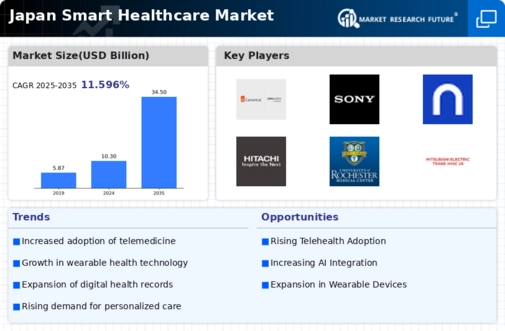Integration of Healthcare Systems
The integration of healthcare systems in Japan is emerging as a vital driver for the smart healthcare market. Efforts to create a seamless flow of information between healthcare providers, patients, and insurers are gaining momentum. This integration facilitates better data sharing and enhances patient care coordination, ultimately leading to improved health outcomes. The Japanese government is promoting initiatives to standardize health data formats, which is expected to streamline processes and reduce costs. As a result, the smart healthcare market is likely to benefit from increased efficiency and effectiveness in healthcare delivery, with a projected market growth of 12% annually as these systems become more interconnected.
Government Initiatives and Funding
The Japanese government is actively promoting the adoption of smart healthcare technologies through various initiatives and funding programs. The Ministry of Health, Labour and Welfare has allocated substantial budgets to support the development of digital health solutions, aiming to improve healthcare accessibility and efficiency. In 2025, the government plans to invest over ¥100 billion in smart healthcare projects, which is likely to stimulate innovation and attract private sector investment. This proactive approach not only enhances the smart healthcare market but also encourages collaboration between public and private entities, fostering a robust ecosystem for technological advancements in healthcare.
Aging Population and Healthcare Demand
Japan's aging population is a critical driver for the smart healthcare market. With approximately 28% of the population aged 65 and older, the demand for innovative healthcare solutions is surging. This demographic shift necessitates advanced healthcare services that can efficiently manage chronic diseases and provide remote monitoring. The smart healthcare market is poised to address these needs through telehealth services and wearable devices that facilitate continuous health monitoring. As the elderly population grows, the market is expected to expand significantly, with projections indicating a potential growth rate of 15% annually. This trend underscores the importance of integrating technology into healthcare to enhance the quality of life for older adults.
Technological Advancements in Healthcare
Rapid technological advancements are significantly influencing the smart healthcare market in Japan. Innovations in artificial intelligence, big data analytics, and the Internet of Things (IoT) are transforming traditional healthcare practices. For instance, AI-driven tools are being utilized for predictive analytics, enabling healthcare providers to anticipate patient needs and improve outcomes. The integration of IoT devices allows for real-time health monitoring, which is becoming increasingly essential in managing chronic conditions. As these technologies evolve, the smart healthcare market is expected to grow at a compound annual growth rate (CAGR) of around 20% over the next five years, reflecting the increasing reliance on technology in healthcare delivery.
Consumer Awareness and Health Consciousness
There is a growing trend of health consciousness among Japanese consumers, which is driving the smart healthcare market. As individuals become more aware of their health and wellness, they are increasingly seeking solutions that provide real-time health data and personalized care. This shift in consumer behavior is evident in the rising demand for wearable health devices and mobile health applications. Market Research Future indicates that the wearable technology segment alone is projected to reach ¥500 billion by 2026, highlighting the potential for growth in the smart healthcare market. This heightened awareness is likely to encourage further innovation and investment in health technologies.
















